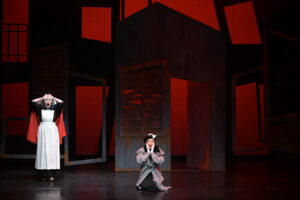Absurdism is a philosophical movement arguing that the universe is illogical and meaningless, and absurdist theatre, such as Eugene Ionesco’s The Killing Game, highlights this through a study of ridiculous human nature in response to extreme tragedy.
Although written in 1970, The Killing Game, being presented through UVic’s Phoenix Theatre, will feel familiar to modern audiences as it revolves around an outbreak of a deadly epidemic that mows through a French city, cutting its citizens down like wheat before a scythe. Scores of theories arise about the origin of the disease, whether it be a natural disaster or a “planned accident,” a conspiratorial plot.
The play is directed by UVic theatre professor Conrad Alexandrowicz, who believes that the real arrowhead of the work is lodged in a biting critique of human judgment within overwhelming situations.

“Over the course of working on this piece, I realized that it could be about a different kind of crisis,” says Alexandrowicz. “It’s not really about a deadly epidemic, it’s a satire on people’s folly, bad behaviour, criminality. It could be something else that [Ionesco] had chosen to reveal all these things. It presents a very dim view of humanity, indeed.”
The real-life roots of absurdism have a much darker history, emerging in the wake of the Second World War and the Holocaust. Senseless horrors such as this are so incomprehensible it creates a void of trauma within a culture, and absurdist comedy is a way of resolving the unresolvable.
“The Holocaust was kind of the ultimate absurdity because it was kind of like a factory, an industrial operation that produced a negation,” says Alexandrowicz. “It didn’t produce goods, it produced this vast emptiness, where millions of people have been killed for no reason, except they were of a particular ethnicity, race, political opinion, or religious belief.”
The crux of comedy in absurdist theatre is that some tragedies are so beyond our comprehension that the result of our inability to process it is uncontrollable, inappropriate laughter, says Alexandrowicz, and this phenomenon is underscored in the satire of The Killing Game.
“The absurdists were very much about the way the comic and the tragic are intertwined, it’s not an either/or proposition. We laugh at things that are horrible sometimes, and I’ve really tried to go as far as I could with that idea,” he says. “Of course we laugh at all this ridiculous activity and nonsense and insane beliefs that people hold. It makes people dropping dead mostly hilarious, and I’m really pushing the comedic aspect of this because I think that’s what [Ionesco] intends us to experience.”
Theatre-goers who are expecting a traditional story should look elsewhere, says Alexandrowicz, because The Killing Game features a non-linear narration with little consistency or coherence, and this ridiculous, unpredictable chaos is iconic of absurdism as a philosophy. However, this doesn’t mean that the production will be unenjoyable, says Alexandrowicz; indeed, quite the opposite, as a tremendous amount of fun can be found in satirizing the ridiculous ways that humans fail to cope with unimaginable trauma.
“We’re all having a rollicking great time doing it, and there’s tons of laughter going on,” he says, “so I think it will actually be a really great night out at the theatre for people.”
The Killing Game
Various times,
Thursday, February 13 to Saturday, February 22
Various prices, Phoenix Theatre
phoenixtheatres.ca
